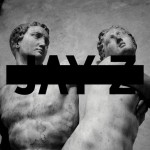Back in the day, rappers wanted to be, and at times were, gangsters. Now the name of the game is transcendence: Rappers aim to be gods.
Enter “Magna Carta… Holy Grail.” The album features an all-star lineup of collaborators, as well as flawless production by Timbaland, Jerome “J-Roc” Harmon and Pharrell Williams, as well as a number of other big names. Each song sports a unique and dynamic beat that, while intricate enough to be intriguing, leaves plenty of room for Jay to tell his story.
Despite all of that freedom, it seems that Jay-Z has gone back to the same tricks. Songs like “Somewhereinamerica,” “Crown” and “Versus” all remind listeners of one thing: he started from nothing and now has everything – the very definition of new money. And here we see a classic tale of the man who got everything he ever wanted – but where do you aim when you already have the keys to the penthouse suite? His thought process is simple: If Kanye West is “Yeezus,” then there’s only one way to top that. To be God.
That being said, Jay-Z plans to be a benevolent god. He announced in mid-June that he would give away free downloads of the album to one million Samsung Galaxy users. Add that to the one million pre-sold copies he claimed to have racked up by his July 4 hashtag of #ALREADYPLATINUM and that’s quite an initial audience for the first 24 hours of a release. Call it omnipotence, because, from up high, Jay-Z declared his album release to be an event and so it was.
Overall, the album is safe. “Watch the Throne” was the first venture into the extreme side of grandiose, so this degree of extravagance seems old hat. Nevertheless, Jay-Z is surrounded by powerful artists throughout the album, including Beyoncé, Rick Ross, Frank Ocean and Justin Timberlake, all of whom shine brightly in their respective roles.
The album starts strong with a Coldplay-esque ballad about the struggles of fame. Intro and chorus vocals by Justin Timberlake are strong and convey a sense of passionate desperation, while elements of Nirvana’s “Smells Like Teen Spirit” stress how hard it is to find real relationships when you’re famous. The track is engaging, but hearing Kurt Cobain, the same man who graced the cover of Rolling Stone sporting a sweatshirt that read “Corporate Magazines Still Suck,” help open an album that was given away for free by a phone company ends up being a hard pill to swallow.
“Tom Ford,” the album’s third track, is worth mentioning, simply because it is a song of the times. It’s deeply minimalistic and ambitious enough to be a single, leaning more toward being a bare bones trap song than your typical hip-hop cut. Layered synthesizers and 808 drums give the song a video game-like sound as Jay raps about making art in the age of social media.
The album waits until “F.U.T.W.” to showcase Jay at his best. The sixth track begins with a wide-open beat and the simple request to let him “be great.” The song reveals his vision of himself as the next runner in the relay race for equality, started by the likes of Martin Luther King, Jr. He tries to explain, through lyrics like “America tried to emasculate the greats/ Murder Malcolm, gave Cassius the shakes,” that this nation hesitates to recognize success by merit, instead choosing to take into account irrelevant factors such as race and class.
All in all, “Magna Carta… Holy Grail” is still a thoroughly enjoyable album. While solid production and the album’s collaborators remind us of the kind of talent that gravitates toward Jay-Z, this 12th rehashing of Hov’s same old themes leaves the listener wanting. If this is evidence of his divinity, his ascension after “The Blueprint 3” is questionable. Even if it doesn’t turn out to be his most memorable album, it serves as a nice, bright burst of light to remember this Fourth of July weekend.
